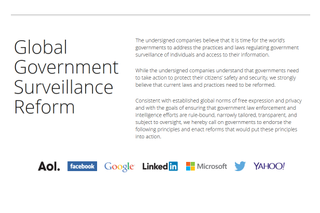Apple, Microsoft and Google urge governments to address surveillance
Internet-focused firms lobby Washington for reform.

Tech firms including Apple, Facebook and Google have co-authored and co-signed a letter to US President Barack Obama and the US Congress petitioning them to reform government surveillance practices across the globe.
Reports about government surveillance have shown there is a real need for greater disclosure and new limits on how governments collect information.
The action has been taken in light of continuing revelations from former NSA contractor Edward Snowden regarding the widespread use of interception techniques by the American National Security Agency (NSA) and its UK equivalent GCHQ to monitor internet traffic and electronic communications.
The letter, which has been published on reformgovernmentsurveillance.com, says: "We understand that governments have a duty to protect their citizens. But this summer's revelations highlighted the urgent need to reform government surveillance practices worldwide.
"The balance in many countries has tipped too far in favour of the state and away from the rights of the individual rights that are enshrined in our Constitution. This undermines the freedoms we all cherish. It's time for a change."
The companies, which include AOL, Apple, Facebook, Google, LinkedIn, Microsoft, Twitter and Yahoo, are urging the US to take the lead in carrying out this reform.
In an individual comment posted on the same website, Larry Page, Google's CEO, said: "The security of users' data is critical, which is why we've invested so much in encryption and fight for transparency around government requests for information.
"This is undermined by the apparent wholesale collection of data, in secret and without independent oversight."
Get the ITPro. daily newsletter
Receive our latest news, industry updates, featured resources and more. Sign up today to receive our FREE report on AI cyber crime & security - newly updated for 2024.
Facebook CEO Mark Zuckerberg added: "Reports about government surveillance have shown there is a real need for greater disclosure and new limits on how governments collect information.
"The US government should take this opportunity to lead this reform effort and make things right."
However, Rafael Laguna, CEO of open source software firm Open-Xchange, criticised their arguments as "flawed".
"This very public display of unity is essentially an acknowledgement from these large internet companies the public has begun to lose trust in them, and as a result in the internet as a whole.
"However, a fundamental flaw in their argument is the double standard of condemning governments for data surveillance, while at the same time harbouring the unquantifiable amounts of data that governments wish to access in the first place."
He added: "Charity begins at home, and the first step to rebuilding trust in an open internet is to address their own data retention policies before pointing the finger elsewhere."
Further revelations from the Snowden Papers this week include the infiltration of Massive Multiplayer Online (MMO) games, such as World of Warcraft, and digital communities by the NSA and GCHQ in order to spy on and, in some cases attempt, to recruit users.
Separately, Washington Post has allegedly uncovered the FBI's use of malware in order to track down a suspect who made repeated bomb threats online.
The agency also requested to be allowed to activate the suspect's webcam remotely, but a judge ruled such an action would be excessively intrusive and could violate his fourth amendment right to protection from unreasonable searches and seizures.

Jane McCallion is ITPro's deputy editor, specializing in cloud computing, cyber security, data centers and enterprise IT infrastructure. Before becoming Deputy Editor, she held the role of Features Editor, managing a pool of freelance and internal writers, while continuing to specialise in enterprise IT infrastructure, and business strategy.
Prior to joining ITPro, Jane was a freelance business journalist writing as both Jane McCallion and Jane Bordenave for titles such as European CEO, World Finance, and Business Excellence Magazine.




